Tiny homes have become a global phenomenon in recent years. These compact living spaces are typically less than 400 square feet in size and offer a unique way of life for those who choose to live in them. The tiny house movement gained popularity in the early 2000s, and since then, many people have opted for this lifestyle to reduce their environmental impact, simplify their lives, and save money on housing costs. In this article Tiny Home Models we will discuss all you need to know about these great homes.
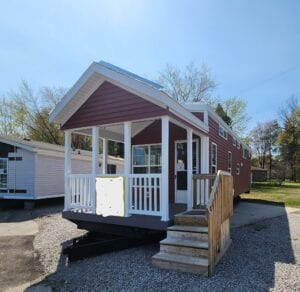
Tiny Home Models
For those interested in building or buying a tiny home, there are several resources available. Tiny house books provide valuable information on everything from design to construction. Online communities also offer support and advice for those starting out on their tiny home journey. Workshops are another great option for learning about the process of building or purchasing a tiny home.
But what if you already own a tiny home? Some companies offer tiny house advertisement services that can help homeowners rent out their space as vacation rentals or full-time residences. This is an excellent way to generate income while sharing your love of tiny living with others.
Living in a tiny home may not be for everyone, but it certainly has its benefits. For starters, it forces you to downsize and declutter your belongings, leading to a simpler and more minimalist lifestyle. It also encourages creativity you can save money or put it towards other passions and pursuits.
What are Tiny Home Models?
Benefits of Tiny Home Models
Cost-Effective Living
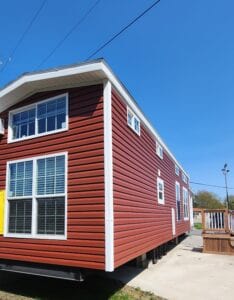
One of the most significant benefits of tiny homes is their cost-effectiveness. With a smaller living space, the cost of building and maintaining a tiny home is significantly lower than that of a traditional house. The average cost to build a tiny home ranges from $20,000 to $100,000, depending on the size and type of materials used. With fewer expenses related to utilities, taxes, and insurance, tiny homeowners can save thousands of dollars each year.
Eco-Friendly Lifestyle
Tiny homes are also an eco-friendly housing option that promotes sustainable living. With less square footage to heat or cool down, tiny homes require less energy consumption compared to larger houses. Moreover, many tiny homeowners choose to incorporate green technologies such as solar panels or composting toilets into their homes for further environmental impact reduction.
Minimalistic Lifestyle
Another benefit of tiny homes is their ability to simplify lifestyles by promoting minimalism. With limited space available in a tiny home, homeowners must prioritize what they need versus what they want. As a result, many people who live in tiny homes report feeling more content with fewer possessions and embracing experiences over material items.
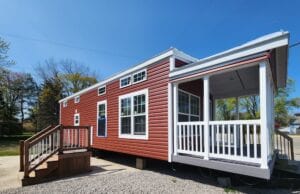
Creative Design Opportunities
Despite their small size, tiny homes offer endless design opportunities for creative individuals who enjoy customizing their living spaces. Many builders specialize in creating unique and functional designs that maximize every inch of available space while incorporating multi-functional furniture pieces such as Murphy beds or built-in storage solutions.
Challenges Faced by Tiny Homeowners
Zoning Laws
One significant challenge faced by many potential tiny homeowners is zoning laws that regulate where one can park or build these types of dwellings legally. While some states have relaxed regulations around accessory dwelling units (ADUs) and backyard cottages in recent years, others still have strict rules regarding minimum square footage requirements for permanent residences.
Limited Space
Living in a small space can be challenging for some individuals, especially those who are used to living in larger homes. Tiny homeowners must be creative as every inch of space counts. Some people may find the lack of privacy or separation between living areas challenging.
Mobility Restrictions
While many tiny homes are built on wheels for mobility purposes, this can also present challenges for homeowners who want to travel with their home. Some states have restrictions on where one can park a tiny home overnight or long-term, making it difficult for those who wish to live a nomadic lifestyle.
Benefits of Living in a Tiny Home Model
Lower Cost of Living
Living in a tiny home can significantly reduce your cost of living. With the average cost of a traditional home in the United States being over $200,000, it is no surprise that many people are looking for more affordable housing options. Tiny homes offer an alternative solution to this problem. The cost of building or buying a tiny home can range from $10,000 to $100,000 depending on the size and materials used.
One way that tiny homes save you money is by reducing your utility bills. Since they are smaller than traditional homes, they require less energy to heat and cool. Many tiny homes use renewable energy sources such as solar panels which can further reduce your monthly expenses.
Another benefit of living in a tiny home is that it allows you to live debt-free or with minimal debt. Since the cost of owning a tiny home is much lower than that of a traditional home, you can pay off your mortgage faster or avoid taking out loans altogether.
Minimalism and Decluttering
Living in a small space forces you to adopt a minimalist lifestyle and declutter your possessions. This can be incredibly liberating as it frees up mental space and reduces stress levels. When you live in a small space, you have to be intentional about what items you bring into your home since every item takes up valuable real estate.
Many people who have downsized into tiny homes report feeling happier and more content with their lives. They find that they have more time for hobbies and activities they enjoy since they spend less time maintaining their living space.
Eco-Friendly and Sustainable
Tiny homes are often built using sustainable materials such as reclaimed wood or recycled steel which reduces their environmental impact. Since they require fewer resources to build and maintain than traditional homes, they are considered more eco-friendly overall.
Another benefit of living in a tiny home is that it encourages sustainable habits such as composting and recycling due to the limited space available. Many tiny homes also incorporate off-grid systems such as rainwater collection and solar power which further reduces their environmental impact.
Mobility and Flexibility
One of the biggest advantages of living in a tiny home is that it allows you to be more mobile and flexible. Since they are often built on wheels, you can easily move your home from one location to another without having to sell or buy a new property.
This flexibility also allows you to live in areas where traditional housing may not be available or affordable. For example, if you want to live near a beach or in a remote area, a tiny home may be the perfect solution.
Sustainable Living in a Tiny Home
Reducing Environmental Impact with Tiny Homes
Tiny homes have become increasingly popular in recent years, and for good reason. These compact living spaces promote sustainable living by reducing the amount of resources needed for construction and maintenance. In this section, we’ll explore how tiny homes can help reduce your environmental impact.
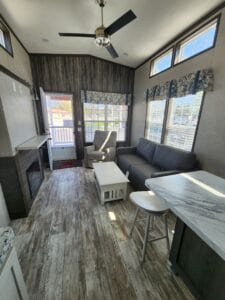
Minimalist Lifestyle
Living in a tiny home encourages people to adopt a minimalist lifestyle. With limited space, it becomes necessary to prioritize what is truly essential. This shift towards minimalism reduces the carbon footprint of individuals who live in tiny homes. By owning fewer possessions, they consume less energy and resources than those who live in larger homes. Many tiny homeowners choose to repurpose or upcycle items instead of buying new ones, further reducing their environmental impact.
Creative Solutions
The compact size of a tiny home can inspire creative solutions for furniture and storage. For example, using a coffee table that doubles as storage space is an excellent way to maximize functionality while minimizing clutter. Other innovative solutions include built-in shelving units and multi-functional furniture such as Murphy beds that fold up into the wall when not in use.
Cost Savings
By living in a tiny home, people can save money on utilities and other expenses. The smaller size means lower heating and cooling costs, as well as reduced water usage. This allows homeowners to allocate more resources towards sustainable practices such as installing solar panels or purchasing organic produce from local farmers’ markets.
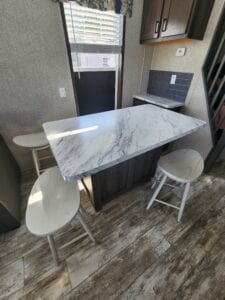
Eco-Friendly Features
Many tiny homes incorporate eco-friendly features such as solar panels and composting toilets. Solar panels provide renewable energy without relying on fossil fuels while composting toilets reduce water usage and create nutrient-rich soil for gardening purposes. These features not only promote sustainability but also inspire others to adopt similar practices.
Case Study: The Tiny House Movement
The Tiny House Movement is an excellent example of how small changes can make a big difference in reducing our environmental impact. By downsizing their living spaces, tiny homeowners have reduced their carbon footprint and inspired others to do the same. Many tiny homes are built with sustainable materials such as reclaimed wood and recycled steel.
Maximizing Space in a Tiny Home
Loft Beds: The Ultimate Space-Saving Solution
Loft beds are the ultimate solution. Not only do they provide an elevated sleeping area that frees up valuable floor space, but they also offer additional storage options underneath. Loft beds come in various styles and sizes, making them suitable for any tiny home. They can be custom-built or purchased from furniture stores that specialize in small-space living.
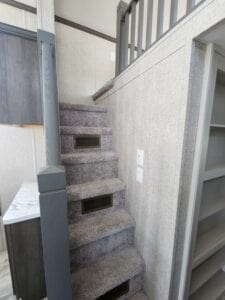
One of the most significant advantages of loft beds is their versatility. They can be designed to suit different needs and preferences, such as incorporating built-in desks or bookshelves into the design. Loft beds are also ideal for creating separate zones within a tiny home without sacrificing precious square footage.
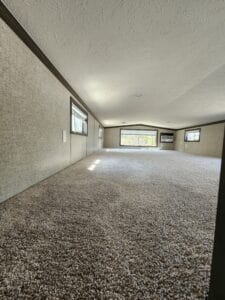
Multi-Functional Furniture: A Smart Way to Save Space
Another way to maximize space in a tiny home is by using multi-functional furniture. This type of furniture serves more than one purpose, such as a sofa bed or an ottoman with hidden storage inside. Multi-functional furniture is perfect for small spaces because it eliminates the need for multiple pieces of furniture that take up valuable real estate.
Incorporating Storage Under the Bed or Stairs
Storage is essential while under-stair storage can be customized with shelves or cabinets.
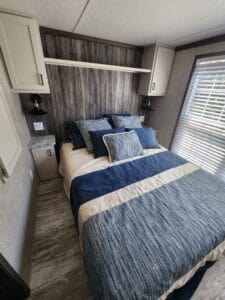
Murphy Beds: The Perfect Solution for Tiny Home Bedrooms
A Murphy bed is another great option for maximizing space in a tiny home bedroom. It folds up vertically against the wall during the day, creating more floor space and allowing you to use your bedroom for other activities besides sleeping. Murphy beds come in various sizes and styles, including those with built-in shelving or desks.
Utilizing Vertical Space with Shelving or Hanging Storage
One of the best ways to maximize space in a tiny home is by utilizing vertical space. This can be achieved through the use of shelving or hanging storage. Wall-mounted shelves can provide additional storage for books, decor, and other items while freeing up floor space. Hanging storage options include hooks and racks that can hold everything from pots and pans to clothing and accessories.
Custom Furniture: A Tailored Solution for Your Tiny Home
Building custom furniture into your tiny home is an excellent way to maximize every inch of available space. Custom furniture can be designed to fit specific areas of your home, such as a built-in desk or bench that fits perfectly under a window. By opting for custom furniture, you can ensure that every piece serves a purpose and contributes to the overall functionality of your tiny home.
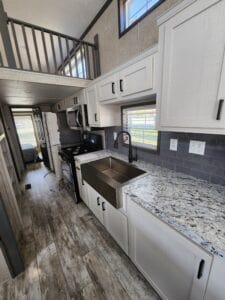
DIY Tiny Home Building Tips
Research and Compare Builders Before Starting Your DIY Tiny Home Project
Before embarking on your DIY tiny home journey, it’s important to do your research and compare different builders. While building a tiny home may seem like a simple task, it requires specialized knowledge and skills that not all builders possess. By researching and comparing builders, you can ensure that you choose the right one for your project.
Start by looking at reviews from previous clients to get an idea of their work quality. You can also ask for references or portfolios of past projects to see if their style matches your vision. Consider the builder’s experience with tiny homes specifically. Building a traditional house is very different from building a tiny home, so make sure the builder has experience in this area.
Using Recycled or Repurposed Materials Can Save Money and Make Your Tiny Home Eco-Friendly
One of the benefits of building a tiny home is that it allows you to live more sustainably. One way to achieve this is by using recycled or repurposed materials in your construction process. Not only does this save money, but it also reduces waste and minimizes environmental impact.
There are many options for using recycled or repurposed materials in your build. For example, reclaimed wood can be used for flooring or walls, while old shipping containers can be turned into unique living spaces. You could even use discarded windows or doors as part of your design.
Plan Out Your Layout and Design Carefully
When designing a tiny home, every inch counts! It’s important to plan out your layout carefully to maximize space and functionality. Consider how you will use each room and what furniture will be necessary.
One popular design trend is incorporating multi-functional furniture pieces such as storage beds or convertible tables. Another option is utilizing vertical space with lofted sleeping areas or built-in shelving units.
Don’t Be Afraid to Ask for Help or Advice
Building a tiny home can be a daunting task, especially if you’re doing it on your own. Don’t be afraid to ask for help or advice from experienced builders or DIY communities. There are many resources available online and in-person to guide you through the process.
Joining a tiny home community or attending workshops can provide valuable insights and support. You could also consider hiring a consultant or contractor for specific aspects of your build, such as electrical work or plumbing.
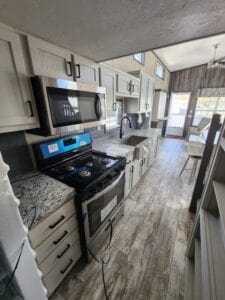
Creative Storage Solutions for Tiny Homes
Drawers: The Ultimate Storage Solution for Tiny Homes
Space is a precious commodity. Therefore, it’s essential to make the most of every inch available. One of the best ways to do this is by utilizing drawers as storage solutions. Drawers are versatile and can be customized to fit any space. They keep items organized and out of sight, making them perfect for tiny homes.
Designing Custom Storage Solutions for Tiny Homes
Custom storage solutions are crucial when designing a tiny home. Every inch counts, so it’s essential to use creative storage solutions that maximize space while keeping everything organized. Built-in drawers under beds or stairs are excellent examples of custom storage solutions that can help save space in a tiny home.
Painted Storage Units Add Personality
Painting storage units with bright colors or patterns not only adds personality but also makes it easier to locate specific items. For example, painting each drawer a different color can help differentiate between clothing types or household items such as towels and linens.
Creative Book Storage Solutions
Books can take up a lot of space in tiny homes, but there are several creative storage solutions available that can help keep them organized and easily accessible. Built-in bookshelves are an excellent option for those who have enough wall space available. Hanging book racks are another great solution that doesn’t take up floor space.
Best Appliances for Tiny Home Models
Compact and multi-functional appliances are ideal for tiny home models. With limited space, it’s important to choose appliances that can perform multiple functions without taking up too much room. Energy-efficient features help save space and reduce utility costs.
Stackable Washer and Dryer Units
For small laundry areas in tiny homes, stackable washer and dryer units are perfect. These units take up less floor space than traditional side-by-side machines while still providing the convenience of an in-home laundry setup. Plus, many models now come with energy-saving features such as moisture sensors that prevent over-drying and save on electricity costs.
Induction Cooktops
Induction cooktops are a great choice. They’re safer than traditional gas or electric stoves because they don’t use an open flame or red-hot coils. Instead, they use magnetic fields to heat the cookware directly. This means that the surface of the cooktop stays cool to the touch, reducing the risk of burns or fires. Induction cooktops are also more efficient than traditional stovetops because they transfer heat directly to the pan instead of heating up the surrounding air.
Combination Microwave-Convection Ovens
Another great appliance for tiny homes is a combination microwave-convection oven. These appliances can perform multiple cooking functions in one unit, saving valuable counter space. They can be used as a regular microwave for quick reheating or defrosting, but they can also function as a convection oven for baking and roasting foods. Many models also come with grilling or broiling settings for even more versatility.
Energy-Efficient Features
In addition to choosing compact and multi-functional appliances, it’s important to look for models with energy-efficient features when outfitting a tiny home kitchen or laundry area. For example:
Off-Grid Living in Tiny Home Models
Backyard Tiny Homes for Off-Grid Living
Living off the grid is becoming an increasingly popular lifestyle choice for many people. One way to achieve this is by living in a tiny home model, which can be set up in your backyard or on a plot of land. With the right setup and equipment, it’s possible to live comfortably without relying on traditional utilities.
Tumbleweed is a company that offers various off-grid models, including the Gooseneck and Park Model. These homes are designed with sustainability in mind and come equipped with solar panels, composting toilets, and rainwater collection systems. Tumbleweed’s homes are also customizable, allowing you to choose the features that best suit your needs.
Wind River Tiny Homes is another company that lives up to its name by incorporating sustainable wood materials into their builds. Their homes are designed to be energy-efficient and feature high-quality insulation to keep you warm in the winter and cool in the summer. Wind River’s homes are also customizable, so you can create a space that feels like home.
Off-Grid Tiny Home Communities
If you’re looking for a sense of community while living off-grid, there are several tiny home communities forming across the country. These communities provide support and camaraderie while still allowing residents to maintain their independence.
One example of an off-grid community is Earthship Village Colorado. This community consists of 12 self-sufficient Earthships (a type of eco-friendly building) built from recycled materials such as tires and bottles. The community shares resources such as water collection systems and greenhouses.
Pricing for Off-Grid Tiny Home Models
The price of off-grid tiny home models varies depending on several factors such as size, model, and features. Tumbleweed’s Gooseneck model starts at around $87,000 while their Park Model starts at around $61,000. Wind River’s office model starts at around $85,000 while their shop model starts at around $100,000.
If you’re looking for a more affordable option, crawl space and hand-built tiny homes are also available. These options can cost anywhere from $10,000 to $30,000 depending on the size and features.
Eco-Friendly Features of Tiny Home Models: Sustainable Living
Sustainability is the key to a better future, and tiny homes are leading the way in promoting sustainable living. These small dwellings are built with eco-friendly materials, use energy-efficient appliances and systems, and promote a minimalist lifestyle that reduces waste and consumption. In this section, we will explore the eco-friendly features of tiny homes that make them an ideal choice for those who want to live sustainably.
Built with Eco-Friendly Materials
Tiny homes are built with high-quality materials that are both durable and sustainable. Many builders use reclaimed or salvaged materials to construct these homes, reducing waste while giving each home its unique style. Other builders use environmentally friendly products such as bamboo flooring or low VOC paints to minimize their impact on the environment.
Maximizing Natural Light and Ventilation
One of the most significant benefits of living in a tiny home is the ability to maximize natural light and ventilation. These homes can be designed with large windows or skylights that allow natural light to flood into every room. This not only saves energy but also creates a bright and airy atmosphere that promotes well-being.
Tiny homes can be designed with cross-ventilation in mind, allowing fresh air to circulate throughout the home without relying on air conditioning systems. This feature not only reduces energy consumption but also improves indoor air quality.
Energy-Efficient Appliances and Systems
Tiny homes are equipped with energy-efficient appliances such as refrigerators, stoves, and water heaters that consume less power than their traditional counterparts. Many tiny homeowners opt for solar panels or wind turbines to generate their electricity, further reducing their carbon footprint.
Composting Toilets
Another eco-friendly feature of tiny homes is composting toilets. These toilets do not require any water or plumbing connections; instead, they break down human waste into compost material that can be used as fertilizer for plants. Composting toilets are an excellent way to reduce water consumption and promote sustainable living.
Minimalist Lifestyle
Living in a tiny home promotes a minimalist lifestyle, which means reducing the amount of waste and consumption. Tiny homeowners often have limited space, which forces them to be creative with their belongings. This lifestyle encourages people to buy only what they need and to get rid of anything that no longer serves a purpose.
Closer Connection to Nature
Finally, living in a tiny home encourages a closer connection to nature and the environment. Many tiny homes are built on wheels or in remote locations, allowing homeowners to live off-grid and immerse themselves in nature. This connection promotes a healthier and more sustainable lifestyle while reducing our impact on the planet.
Zoning Laws and Regulations for Tiny Home Models
Varying State and Municipal Laws
The laws surrounding tiny homes are complex, with regulations varying from state to state and even municipality to municipality. While some areas permit tiny homes as primary residences, others only allow them as accessory dwelling units or vacation homes. It’s important to research local zoning laws before building or buying a tiny home to ensure compliance with all legal requirements.
Minimum Square Footage Requirements
Many jurisdictions have minimum square footage requirements for residential structures, which can make it difficult to legally live in a tiny home. For example, the International Residential Code (IRC) requires that any habitable room be at least 70 square feet in size, while other codes require a minimum of 120 square feet for the first habitable room and an additional 50 square feet for each subsequent room.
Safety Standards
Some places require that tiny homes be built to certain safety standards, such as being on a permanent foundation or having specific fire safety features. For example, California requires that all new construction meet strict energy efficiency standards, which can be difficult for tiny homes due to their limited space. Many states require that tiny homes be built on a permanent foundation in order to comply with local building codes.
High winds can affect tiny homes read our article on Mobile Home Anchors.
Alternative Zoning Options
Despite the challenges presented by zoning laws and regulations for tiny homes, some communities are exploring alternative zoning options in order to accommodate the growing interest in these unique living spaces. One option is creating tiny home villages where multiple small dwellings are clustered together on one piece of land. Another option is allowing more flexible land use regulations that permit homeowners to build smaller structures on their property without requiring them to meet standard minimum square footage requirements.
Read our article on How Much Does It Cost to Prepare a Mobile Home for Land.
Tiny Homes as Vacation Rentals: Unique Getaways
Unique Getaways: Tiny Homes as Vacation Rentals
Looking for a unique and cozy vacation experience? Look no further than tiny homes. These small, yet stylish homes are becoming increasingly popular as vacation rentals due to their size and amenities. In this blog post, we’ll explore why tiny homes make great vacation rentals and what sets them apart from traditional accommodations.
Communal Spaces and Outdoor Activities
Many tiny home parks offer a variety of amenities that make them an attractive option for travelers. From communal spaces like fire pits and BBQ areas to outdoor activities like hiking trails and fishing ponds, there’s something for everyone. These parks often have a sense of community that is hard to find in traditional hotels or resorts. Guests can mingle with other travelers or enjoy the peace and quiet of their own private space.
Comfortable Beds and Modern Amenities
Despite their small size, tiny homes often feature comfortable beds and modern amenities like air conditioning, heating, Wi-Fi, and even smart TVs. Some tiny homes even have full kitchens with everything you need to cook your own meals. This makes staying in a tiny home both convenient and cost-effective compared to traditional accommodations.
Generating Income through Advertisement
If you’re the owner of a tiny home, advertising it as a vacation rental can be a great way to generate income while sharing your dream of living in a small space with others. Many websites like Airbnb or Vrbo allow homeowners to list their properties as vacation rentals for short-term stays. With the growing popularity of tiny homes, there’s never been a better time to turn your dream into a profitable business venture.
Memorable And Affordable Option
Whether you’re looking for a weekend getaway or an extended staycation, staying in a tiny home is sure to be memorable experience that won’t break the bank. With prices ranging from $50-$200 per night depending on location and amenities offered, it’s an affordable option for budget-conscious travelers who still want all the comforts of home.
Tiny House Insurance
No matter what you decide to do with your tiny house you need to have it insured. Insuring your home will protect it from fire, water and storm damage. Customers save on average $250 a year when they use this insurance. Check it out here. Tiny House Insurance.
Final Thoughts on Tiny Home Models
In conclusion, tiny homes are more than just a trend or a fad. They represent a unique way of living that can benefit people in many ways. Living in a tiny home can help you live sustainably, reduce your carbon footprint, and save money on utilities and maintenance costs. It can also help you simplify your life and focus on what truly matters.
If you’re considering building or buying a tiny home, there are many resources available to help you get started. From DIY tips to creative storage solutions, there’s no shortage of information out there for those who want to make the most of their small space.
Overall, whether you’re looking for an eco-friendly lifestyle or simply want to downsize and simplify your life, a tiny home could be the perfect solution for you. With careful planning and attention to detail, anyone can create a comfortable and functional living space that meets their needs and reflects their personal style.
So if you’re ready to embrace the tiny home lifestyle, don’t hesitate to start exploring your options today. Whether you choose to build your own home from scratch or purchase one from a reputable builder, there’s no doubt that this unique way of living can bring many benefits into your life. So why wait? Start exploring the world of tiny homes today!
You might also be interested in our article Park Model Mobile Home.
FAQ’s: Tiny Home Models
Are tiny houses still popular?
Tiny houses continue to be popular in 2023, as many people are drawn to their minimalist lifestyle, affordability, and sustainability. Their popularity remains steady as an alternative housing option.
Is it really cheaper to live in a tiny house?
Living in a tiny house can be more cost-effective than a traditional home due to lower construction and maintenance costs. However, the overall savings depend on various factors, including location and personal lifestyle choices.
How much does a tiny house cost?
The cost of a tiny house can vary widely depending on factors such as size, materials, location, and custom features. On average, a tiny house may cost between $20,000 to $100,000 or more, but this can vary significantly.

